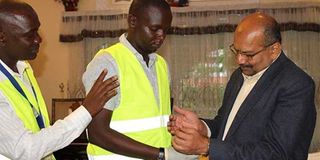Premium
Why businessman Kumar is off the hook in Sonko bribery case

EACC detectives arrest Praful Kumar (right) in Kanamai Kilifi on August 20, 2018 as he attempted to bribe Nairobi Governor Mike Sonko.. PHOTO | MOHAMED AHMED | NATION MEDIA GROUP
A Mombasa court has dropped corruption charges against Nairobi businessman Praful Kumar after key witnesses in the case, including former Nairobi governor Mike Sonko, failed to appear in court.
Mr Kumar had been charged with attempting to bribe Mr Sonko to approve and continue building his Grand Monar Hotel in Gigiri in Nairobi.
The court was told he attempted to bribe Mr Sonko by offering Sh5 million as an inducement to approve the project in 2018.
On Friday, Chief Magistrate Martha Mutuku said there was no need to keep the case pending in court when the Director of Public
Prosecutions had failed to produce a single witness to give evidence against Mr Kumar.
“I dismiss the case against the accused person for non-attendance of witnesses,” said the magistrate.
The court heard that witnesses in the case had become unresponsive to summons, while the rest said they were busy with campaigns.
Ms Mutuku rejected a plea by the state to have the case withdrawn under a section of the law that would enable the DPP to charge Mr Kumar with the same offence if witnesses agree to come to court.
“I find this application unreasonable. The DPP has had adequate time to [provide] witnesses. The request is unmerited and made in bad faith,” said the magistrate.
The suspect faced second and third counts of offering Sh2 million to Mr Sonko to approve the construction of the building.
Mr Kumar had denied all the charges, setting the case for a full hearing.
Since he was charged in 2018, Mr Kumar has been in courts in Mombasa and Nairobi for the bribery case.
He was arrested by Ethics and Anti-Corruption Commission sleuths in Kanamai, Kilifi County, where the bribing is said to have happened.
In the weeks leading to his arrest, Nairobi County had stopped the construction of the hotel on August 16, 2018.
The EACC alleged that for the construction of this hotel to proceed, Mr Kumar sought to compromise Mr Sonko to soften his stance.
It was at this point that the EACC claimed Mr Kumar travelled to Kilifi to meet Mr Sonko so as to offer him the bribe.
This led to his arrest and arraignment in a Mombasa court.
But before the case could be heard, Mr Kumar, through his advocate Kennedy Marete, demanded that DPP Noordin Haji supply him with electronic data containing the alleged communication between him and the witnesses.
Mr Kumar said the electronic records would have enabled him to put up a strong defence against the bribery allegations because without them he would lack full, honest and fair disclosure.
He asked the court to order the prosecution to supply him with all the calls he exchanged with Mr Sonko on August 20, 2018 when he was alleged to have communicated with the then governor to offer bribes.
Mr Marete also asked the court to supply the defence with all the telephone numbers and data records of the witnesses in the case that he allegedly spoke to about the bribe and the exact locations that the telephones originated from.
Instead of providing the suspect with these details, the DPP opposed this application, noting that by directing the office to provide the items, the court would appear to be asking the prosecution to listen to people's private messages and tap calls thereby infringing their privacy.
But the court ruled in favour of Mr Kumar, directing the DPP to supply him with the items, and scheduled the matter for hearing.
Chief Magistrate Edna Nyaloti noted that the prosecution would not be overstepping its mandate by providing the items.
In this case, the magistrate argued, the data that the businessman was demanding from the state was not a matter of national security and should be provided as part of the prosecution’s evidence to prove its case against Mr Kumar.
The DPP then moved to the High Court to protest against the magistrate’s ruling, arguing that providing the items would infringe Mr Sonko’s privacy.
The prosecution did not provide any witness or the crucial documents that the businessman wanted.
The case had been mentioned and adjourned since 2018, with no witness appearing to testify on behalf of the state.





